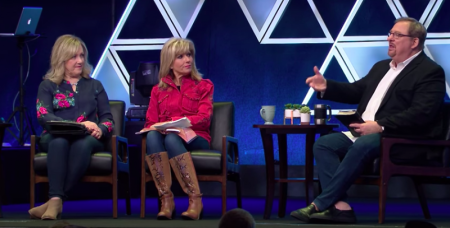What Beth Moore and Max Lucado have in common

Beth Moore and Max Lucado made headlines at a recent conference in ways you might not expect.
A one-day summit on sexual abuse and harassment was held at Wheaton College. As the organizer explained, the group met “to help amplify a conversation” on this difficult subject.
Beth Moore was the featured speaker. Her story of sexual abuse was shared by others who spoke. Then Max Lucado closed the conference by sharing for the first time his own story of sexual abuse as a child.
They are not alone. According to a recent survey, eight in ten pastors know someone who has experienced domestic or sexual violence. A fifth of the clergy has experienced such violence themselves, including sexual assault, rape, or child sexual abuse.
“We are living in an age of historical reckoning.”
The study found that all four founders of the school, one of the oldest and most influential seminaries in the US, owned slaves. Other findings: early faculty and trustees defended slavery as “righteous”; the seminary supported the Confederacy during the Civil War; and the school opposed racial equality well into the twentieth century.
Albert Mohler Jr., the seminary’s longtime president, prefaced the report: “We are living in an age of historical reckoning. The moral burden of history requires a far more direct and far more candid acknowledgment of the legacy of this school in the horrifying realities of American slavery, Jim Crow segregation, racism, and even the avowal of white racial supremacy.”
Dr. Mohler added: “We will not attempt to rewrite the past, nor can we unwrite the past. Instead, we will write the truth as best we can know it. We will tell the story in full, and not hide.”
“Buildings, budgets, and baptisms”
When I became a Christian in 1973, the evangelical churches I knew focused primarily on evangelism.
Sunday sermons were intended to lead people to “walk the aisle” to the front of the sanctuary where the pastor or a staff member waited to “lead them to Christ.” Tuesday night outreach, where members would make evangelistic visits in the community, was a vital part of the weekly program. Evangelism training courses were expected for all leaders and members. “Who did you win to Jesus this week?” was a common question.
In the 1980s, the focus for many evangelicals shifted to “seeker-sensitive” worship and therapy-based sermons. Services were designed with non-Christians in mind; messages focused on the felt needs of attenders. Sermons on marriage, money management, and self-esteem were common.
Both approaches measured success by numbers–conversions and baptisms, attenders and members, finances and buildings. In my years as a pastor, it was clear to me that my work was evaluated by “buildings, budgets, and baptisms.”
I still believe that lost people need Jesus and Christians need to share him with the world. I still believe that pastors and churches should meet the needs of people as we share God’s love with them. And I still agree that measuring results is important.
How God measures our love for him
However, I am convinced that we must do much more to apply God’s word to the entire spectrum of issues we face.
For example, sexual abuse and racism are sins that destroy lives, families, and futures. God’s word clearly calls us to “flee from sexual immorality” (1 Corinthians 6:18) and to hold our leaders accountable for personal integrity (cf. Titus 2:7-8). Racial prejudice is an affront to the God who created us all (Genesis 1:27) and who loves each of us as a father loves his children (Matthew 7:11).
God requires us to care for the impoverished (1 John 3:17), the imprisoned (Matthew 25:36), the immigrant (Exodus 22:21), and the mistreated and abused (Hebrews 13:3). We are called to defend children (Matthew 18:5-6) and provide for orphans and widows (James 1:27). We are to value women just as highly as men (Galatians 3:28) and to honor their leadership and ministry (cf. Romans 16:1-4).
“Gospel” means “good news.” The good news is that God cares about every dimension of our lives and culture. Not only does he call us to do the same–he measures our love for him by our love for those in need (Matthew 25:31-46).
This is only logical. You cannot love me and mistreat my children. Our Father feels the same way.
“You have Christ in your neighbor”
Martin Luther King Jr. called the church “the conscience of the state.” Tragically, the culture sees clergy abuse scandals and discrimination against minorities and women (see Beth Moore’s poignant “A Letter to My Brothers“) and considers us part of the problem rather than the solution.
I applaud those who spoke at the Wheaton conference for revealing their pain and challenging the church to defend victims like themselves. I applaud Southern Seminary for beginning the process of confession regarding racism in its past.
Now it’s our turn. Would you ask the Lord if you need to repent of prejudice, injustice, or apathy in your attitudes and actions? Would you ask him if you need to seek forgiveness from others?
If so, act immediately. You cannot be right with your Father if you are wrong with one of his children: “If you are offering your gift at the altar and there remember that your brother has something against you, leave your gift there before the altar and go. First be reconciled to your brother, and then come and offer your gift” (Matthew 5:23-24).
In a sermon on the Bethlehem innkeeper, Martin Luther said to his audience: “There are many of you in this congregation who think to yourselves: ‘If only I had been there! How quick I would have been to help the baby!'” Then he asked them, “Why don’t you do it now? You have Christ in your neighbor.”
Who is your neighbor today?
Originally posted at Denison Forum.





















